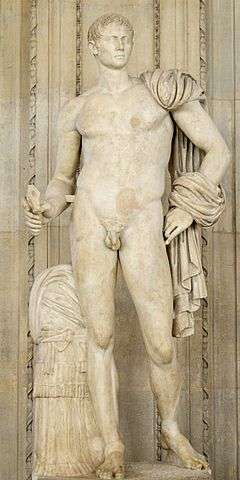Heroic nudity


Heroic nudity or ideal nudity is a concept in classical scholarship to describe the use of nudity in classical sculpture to indicate that a sculpture's apparently mortal human subject is in fact a hero or semi-divine being. This convention began in archaic and classical Greece and was later adopted by Hellenistic and Roman sculpture. This concept operated for women as well as for men, with females having themselves portrayed as Venus and other goddesses.[1] Particularly in Roman examples like the Tivoli General or Delos "Pseudo-Athlete", this could lead to an odd juxtaposition of a hyper-realistic portrait bust in the Roman style (warts-and-all for the men, or with an elaborate hairstyle for the women) with an idealised god-like body in the Greek style.
As a concept, it has been modified since its inception, with other types of nudity now recognised in classical sculpture—e.g., the pathetic nudity of brave but defeated barbarian enemies like the Dying Gaul.[2] Tonio Hölscher has even rejected the concept entirely for Greek art of the 4th century BC and earlier.
- A Seleucid prince depicted in heroic nudity, National Museum of Rome

 Roman statue with the head of Marcellus (1st century CE, after a 5th-century BC Greek prototype)
Roman statue with the head of Marcellus (1st century CE, after a 5th-century BC Greek prototype)- Antonio Canova: Napoleon as Mars the Peacemaker (1802-1806) - Napoléon en Mars désarmé et pacificateur, Apsley House, London
See also
Notes and references
- Hallett, Christopher H. (2005). The Roman Nude: Heroic Portrait Statuary 200 B.C.-A.D. 300. Oxford University Press. ISBN 978-0-19-924049-4.
- Casana, Jesse (2007). "The Problem with Dexileos: Heroic and Other Nudities in Greek Art". American Journal of Archaeology. 111 (1): 35–60. doi:10.3764/aja.111.1.35. ISSN 0002-9114.
- Osborne, Robin (1997). "Men Without Clothes: Heroic Nakedness and Greek Art". Gender & History. 9 (3): 504–528. doi:10.1111/1468-0424.00037. ISSN 0953-5233.
- Stevenson, Tom (April 1998). "The 'Problem' with Nude Honorific Statuary and Portraits in Late Republican and Augustan Rome". Greece & Rome. 2. Cambridge University Press. 45 (1): 45–69. JSTOR 643207.
| Wikimedia Commons has media related to Heroic nudity. |